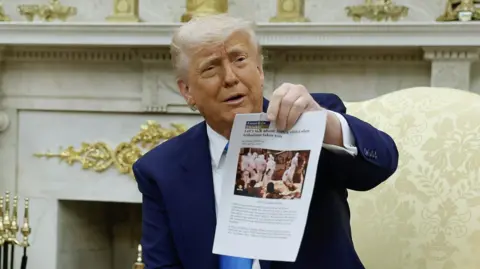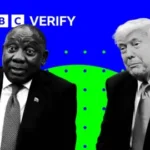In the past few weeks, South Africa has been witness to an unexpected and intense political confrontation involving U.S. President Donald Trump and South African President Cyril Ramaphosa. While the two leaders operate in vastly different spheres—Trump with his controversial tenure in the United States and Ramaphosa as a leading figure in South African politics—the recent interactions have sparked widespread discussion both locally and internationally.
Background of the Tensions
The confrontation primarily revolves around issues related to governance, economic policies, and perceptions of leadership. Donald Trump has publicly expressed critical opinions about South Africa’s political landscape, often emphasizing concerns over governance issues and the country’s approach to economic reforms. Meanwhile, Cyril Ramaphosa has been focused on stabilizing South Africa’s economy amid ongoing challenges such as unemployment, corruption, and social inequality.
The Catalyst: Public Remarks and Social Media
The recent escalation began when Trump made a series of statements on his social media platforms criticizing South African leadership, questioning the country’s direction and commenting on alleged corruption scandals. These remarks drew attention because of Trump’s influence and his history of outspoken, sometimes provocative, commentary on international issues.
In response, Ramaphosa’s office issued a formal statement reaffirming South Africa’s sovereignty and emphasizing the importance of respecting national leadership. The South African government also criticized what it called “unfounded” and “interfering” remarks that could damage diplomatic relations.
Diplomatic Exchanges and Public Disputes
Amidst the rising tensions, there were reports of private diplomatic exchanges. However, these were overshadowed by a series of public exchanges, including interviews and social media posts. Trump reiterated his concerns about governance and alleged corruption, suggesting that South Africa’s political climate was deteriorating. Conversely, Ramaphosa defended his government’s record, highlighting efforts to combat corruption, promote economic growth, and uphold democratic principles.
The confrontation also drew attention because of the broader context of South Africa’s internal struggles. The nation has been grappling with issues such as land reform debates, economic slowdown, and political stability, which have sometimes been criticized by international voices.
Impact on Bilateral Relations and International Perception
While the exchange did not lead to any immediate diplomatic fallout, it raised questions about the future of South Africa’s international relationships. Some analysts warned that continued public disagreements could impact foreign investment and diplomatic cooperation, especially as South Africa seeks to recover from economic setbacks.
Conversely, others viewed Trump’s comments as part of a broader pattern of foreign leaders engaging in rhetoric that can influence domestic perceptions. Ramaphosa’s responses underscored South Africa’s desire to maintain respectful diplomatic ties despite the provocative remarks.
Public and Political Reactions
Within South Africa, reactions to the confrontation have been mixed. Some political figures criticized Trump’s comments as interference in South Africa’s internal affairs. Others viewed the exchange as a reflection of broader geopolitical tensions, with South Africa asserting its independence.
International observers have noted that while such confrontations are not unusual in global politics, the prominence of social media has amplified their visibility and potential impact.
Conclusion
The recent confrontation between Donald Trump and Cyril Ramaphosa underscores the complex dynamics of international diplomacy in the digital age. While it remains to be seen how these interactions will influence future relations, they highlight the importance of diplomatic decorum and mutual respect among world leaders. For South Africa, navigating these tensions will be crucial as it continues to address its internal challenges and strengthen its position on the global stage.
Email Us on editorial@nnafrica.com












